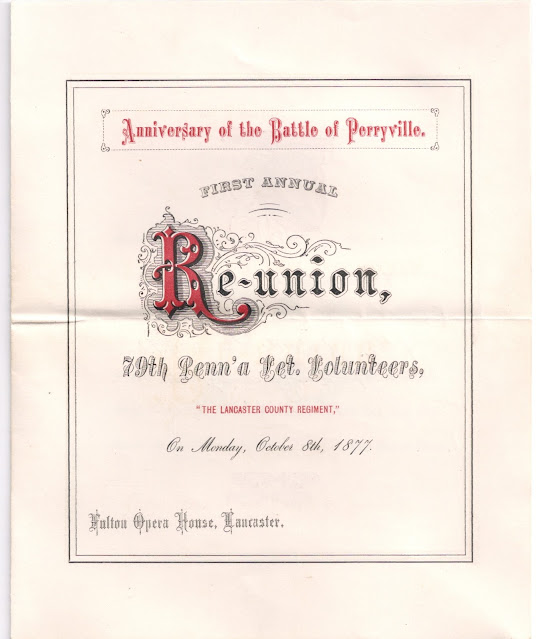Come my dear husband, this is no place for us: A Perryville Story
The 79th Pennsylvania, part of Colonel John Starkweather’s brigade, was marching into action at the Battle of Perryville side by side with the 1st Wisconsin.
“As the solid, serried ranks of glistening bayonets and brave men moved onward with all the regularity and precision of a dress parade, and with the steadiness of veteran troops, the two regiments involuntarily paid just tribute to one another by sending up long and loud cheers,” one veteran recalled. “It was a grand sight! There was no flinching- not a man! Every man stood his ground firmly and manfully.”
But out of the
eyesight of our correspondent, one man did flinch, indeed, making a conscious decision
to flee the battlefield. He can perhaps be forgiven this decision because as John
D. Kautz marched onto the battlefield at Perryville, his German-born wife
Barbara and infant son Christian accompanied him. It’s an interesting if rather
convoluted story.
John D. Kautz
was born April 21, 1839, in Lancaster, Pennsylvania. By the outbreak of the
war, he had married Catherine Barbara Dussinger and was working a farm laborer. In
January 1862, the couple had their first son (and only child) Christian D. Kautz. On
September 5, 1862, John enlisted as a private in Co. H of the 79th Pennsylvania
Infantry. The regiment was one of the few Pennsylvania regiments assigned to
the western theater, and shortly after enlistment, John set off to join the
regiment. What was very unusual is that both Barbara and Christian accompanied him as
he went off to war.
“They journeyed to Pittsburgh by
rail, and from thence to Louisville, Kentucky, by steamboat,” stated Barbara’s
obituary. “There they joined the regiment, and Mrs. Kautz and the baby
accompanied it from there in the baggage wagons. The young wife made herself
useful about the camp and was finally dubbed the "Daughter of the
Regiment." [Other reports stated she was called the “Mother of the
Regiment,” but given her young age (she was only 24), Daughter probably is more
correct. Reportedly, Barbara took up washing for Colonel Henry A. Hambright who
was not only aware of this highly usual arrangement, but apparently condoned
it.]
 |
| Colonel Henry A. Hambright 79th Pennsylvania |
“She was with the 79th at the
Battle of Perryville, and then a funny incident happened,” the obituary
continued. Frightened by the noise and ferocity of the battle Barbara “approached
her husband and cried to him in German, "Come, my dear husband, this is no
place for us. Let us go home." [In German, "Komm, mein lieber Mann, das ist
kein Ort für uns. Lass uns nach Hause gehen."] "And home they started, at once,
soon procuring a rudely made little wagon for the baby.” The young family
reportedly made the 600-mile journey back to Lancaster, Pennsylvania entirely
on foot. All the while, John Kautz had been listed as missing in action as no
one from his regiment had seen him since the battle. In truth, he had gone AWOL
and once he returned to Lancaster, that fact became known to the army and he
became a wanted man.
Barbara Kautz’s obituary simply
states that her husband “returned to the regiment and served “bravely and with credit,”
but the story isn’t so neat and clean. It was the summer of 1863 before authorities
caught up with John Kautz and sent him back to rejoin his regiment, now poised
to march into Georgia as part of General William S. Rosecrans’ campaign to take
Chattanooga, Tennessee. Kautz was court martialed for being absent nearly a
year without leave, but the court acquitted him, stating that Kautz was “always
feeble-minded” and “has a degree of idiocy. He would have been discharged, but
we had marching orders.” Kautz did not accompany the regiment into what became
the Battle of Chickamauga but was instead sent back to a hospital in Nashville,
Tennessee.
 |
| National colors of the 79th Pennsylvania Volunteer Infantry. Note that the fight at Perryville was called "Chaplin Hills," a popular early name for the battle. |
Kautz bounced around the rear
areas of the Army of the Cumberland for the rest of the war, transferring into
the 78th Pennsylvania at one point but going AWOL again from October
17, 1864, to April 25 of the following year (he later claimed ill health). He
took advantage of a general amnesty and procured an honorable discharge on July
12, 1865, mustering out with the 79th Pennsylvania although in all
honesty he had scarcely served more than a few months in its ranks. His final
pay roll record states that his account was never settled and that he was
absent “by virtue of General Order No. 101 of the War Department.”
Kautz returned to his family near Lancaster and resumed his work as a farm laborer. In 1880, he applied for a pension and learned that the desertion charge (from 1864) was still on the books. This took several years to clear up, but by 1887, Kautz had not only been granted a pension, but had gained membership in Thomas Post No. 84, Grand Army of the Republic. Barbara, too, joined the Women’s Relief Corps of the G.A.R. and enjoyed her notoriety as “Daughter of the Regiment” at the 79th Pennsylvania reunions that the couple attended each October with Christian in tow, presumably no longer in a "rudely-made little wagon." At one such event, a photograph was made of the Kautz family, a souvenir of this strange little story of the Battle of Perryville.
Sources:
Letter from “Occasional,” 79th Pennsylvania Volunteer Infantry, Lancaster Daily Inquirer (Pennsylvania), October 20, 1862, pg. 2
Find-A-Grave Memorial for John D. Kautz
Obituaries for Barbara Katherine (Dussinger) Kautz, Lancaster
Intelligencer Journal (Pennsylvania), May 16, 1904, pg. 6; also, Lancaster
New Era (Pennsylvania), May 16, 1904, pg. 2











Comments
Post a Comment